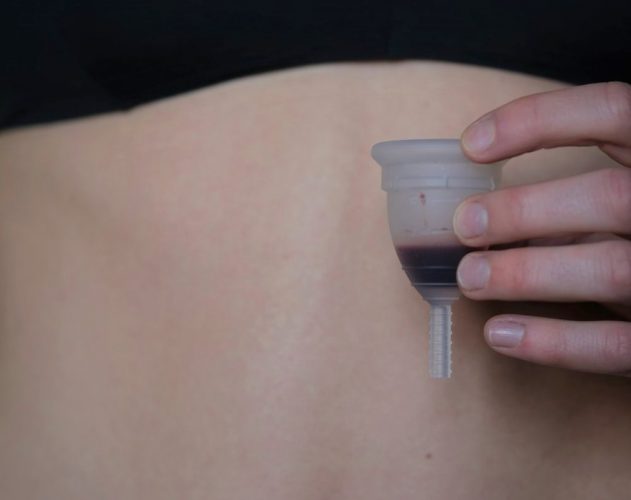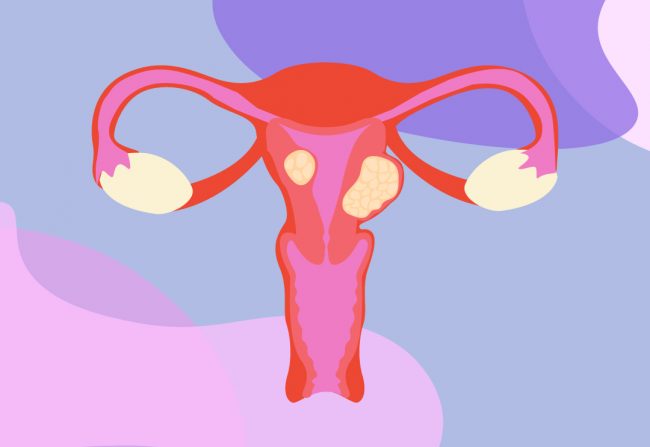Hormone imbalances and the menstrual cycle – natural ways to balance your hormones
While fluctuations in your hormone levels are normal, sometimes they can go out of balance. This imbalance can have a whole host of wide-reaching, and sometimes surprising, effects. In this article, our Mooncup® Advisor Sophia will explain how to spot the signs of a hormonal imbalance and some natural ways that can help.
Hormones and your cycle: signs of an imbalance and some natural ways to help
Mention the word hormones, and you’ll often be met with a groan or look of despair. Yet hormones are essential to life, health and happiness- and we’d be pretty lost without them! They can make you feel on top of the world or like you want to curl up into a ball and hibernate- and a whole complex range of things in between.
Scientists have identified over 50 different hormones at work in the human body. Hormones are often referred to as chemical messengers and they orchestrate or impact pretty much every process in your body. Travelling through your bloodstream, they deliver news and instructions to different parts of your body.
The delicate and rather amazing interplay between hormones really comes into the spotlight in the menstrual cycle. The ebb and flow as you transition from one period to the next is like a finely tuned dance. It affects your moods, energy levels and how you feel physically. Fluctuations in your hormone levels are normal and necessary, but sometimes they can go out of balance.

Who’s who in the fantastic world of hormones
Hefty tomes have been written on the role of hormones. In this article, we are just going to touch on a few of the ‘main players’ associated with all things the menstrual cycle. We explore how these hormonal changes can appear and how to spot signs of a hormonal imbalance.
Oestrogen – production and functions
Oestrogen is mainly produced in the ovaries, but also in the adrenal glands and fatty tissue in our body. Everyone needs oestrogen, not just those who have periods. However, it’s present at much higher levels in those who do, and its role in regulating fertility and periods is enormous. Oestrogen also plays an essential role in the health of the heart, blood vessels, bones, breasts, skin, hair, mucous membranes, pelvic muscles, urinary tract, and brain.
There are actually three types of oestrogen naturally produced within the body and they each come into their own at different life stages: estradiol (most prevalent in the reproductive years), estrone (present following the menopause), and estriol (which hugely increases during pregnancy).
Oestrogen levels rise as we enter puberty- helping our body to mature and develop. During our menstruating years, oestrogen levels are highest mid-cycle, helping to trigger ovulation and increasing blood flow to your vagina. They then drop to their lowest levels when you’re having your period. As we start heading toward the menopause, our oestrogen levels decline.
Progesterone hormone function
Progesterone prepares the body for a potential pregnancy, thickening the lining of the uterus to potentially receive a fertilised egg. If no egg is fertilised, progesterone levels drop, leading to the lining of the uterus being shed during your period.
As we head into the menopause, our progesterone levels drop along with oestrogen.
Luteinising hormone (LH) spurs ovulation
Luteinising hormone (LH) is produced by the pituitary gland in the brain. It spurs ovulation and helps the ovaries to develop the follicles that contain immature eggs in the first part of the menstrual cycle. Just before ovulation, LH levels surge causing the follicle to burst and release the egg. Levels then decrease.
Follicle stimulating hormone (FSH)
Also produced in the pituitary gland, follicle stimulating hormone does what it says on the tin: it stimulates the follicles containing immature eggs to develop and mature. It works closely with the luteinising hormone in this goal, with its levels also dropping off after ovulation.
What are androgens?
Androgens are often called ‘male’ sex hormones. The most famous androgen is testosterone. However, just as with oestrogen, certain levels of these hormones are essential for good health in everyone- just in differing amounts.
Androgens support oestrogen production and repair of tissues in the reproductive organs. They also play a critical role in keeping your bones healthy. They also look after your brain function and overall sense of wellbeing and kick your sex drive into gear. Androgen production surges just before ovulation. There is also a smaller rise in androgen levels just before your period starts.
Insulin controls your blood sugar levels
Insulin controls the amount of glucose (sugar) in your blood at any given moment. It responds to changes in your activity levels, food and drink and other bodily processes. Insulin regulates your body’s metabolism of carbohydrates, fats, and proteins. It also helps store glucose in your liver, fat, and muscles.
In a nutshell? Imbalances in your insulin levels can wreak havoc with pretty much every function in the body as they all need energy generated by the effects of insulin.
Thyroid hormones regulate your metabolism
Thyroid hormones regulate the speed of your metabolism. Too much of these hormones can increase your metabolic rate and lead to many symptoms and a condition called overactive thyroid (hyperthyroidism). On the other hand, if your thyroid is producing too little of these hormones, your metabolism may be slower than normal. This is known as an underactive thyroid (hypothyroidism).
Cortisol is the stress hormone
Cortisol impacts your metabolism, immune system, blood pressure control, sleep cycles, memory formation and blood sugar levels. High levels of cortisol are produced when we are under stress, or with certain medical conditions. It is commonly referred to as the ‘stress hormone’ – which makes it sound pretty unappealing! But it’s essential in certain amounts for our bodies to function healthily.
Dopamine and serotonin – the “happy hormones”
These neurotransmitters also act as hormones, and are often attributed to making us feel good! However, they are also involved in digestion, sleep, bone health, wound healing, memory and attention.
Signs your hormones may be out of balance
A hormonal imbalance happens when you have too much or too little of one or more hormones. Let’s delve into signs that may mean your hormone levels are a little off-kilter and need some attention.
Changes to your periods and hormonal imbalance
You have irregular periods
If the length of your cycle (the gap between periods) keeps changing significantly, you have irregular periods. Your period might come earlier or later than expected.
This is normal when starting your periods, or during the perimenopausal years, as your hormones are recalibrating and finding their new rhythm. However, if you previously had a regular cycle or your periods have always been irregular, something may be out of balance in your body. This can be caused by many things, including stress, disrupted sleep, or a medical condition involving a hormonal imbalance such as PCOS.
Your periods have stopped
Your period may stop for a wide range of reasons. Outside of pregnancy, menopause or certain contraceptive methods, it usually indicates something in your body is out of balance. Some common causes can be stress, sudden weight loss, excess exercise, being significantly overweight, illness and certain medications. If your periods stop, you should speak to your doctor as it can be linked to a hormonal imbalance such as those relating to PCOS or an issue with your thyroid.
You have heavy periods
As many as 1 in 3 of us describe their periods as heavy. However, sometimes heavy periods can be a sign of a health issue, including a potential hormonal imbalance. If your oestrogen and progesterone levels are out of balance, it can lead to the lining of the uterus building up too much. When this thick lining is shed during a period, you will get heavy bleeding.

Imbalances in thyroid hormones, insulin resistance and PCOS can all be linked to heavy periods.
Any ongoing changes or concerns about your periods are always best checked with your doctor. It’s helpful to keep track of your periods and share any other symptoms at your appointment.
Mood changes
It’s a well-known fact that changes in our hormone levels can have a huge impact on our mental and emotional wellbeing. Many of us will experience this as the hormones naturally fluctuate throughout our menstrual cycle. I feel this can be compared to having an eye test at the optician. You look at the same view but depending on which lenses are in place (or what your hormones are up to that day) the vista can range from beautiful to a scene of horror!
The effects of these hormonal ups and downs can be particularly noticeable at the beginning and end of your menstruating years, as your body adjusts to the longer-term increase or decrease of these hormones.
Hormonal imbalance may be to blame for issues such as:
- Increased anxiety, mental ‘fog’, fatigue, memory issues, irritability and low mood have all been linked with oestrogen imbalances. Oestrogen helps to regulate your serotonin levels (the cheerfully named ‘happy hormone’), as well the production and effects of endorphins (more ‘feel-good’ hormonal friends).
- Feelings of anxiety, stress, depression and insomnia can be triggered by imbalances in progesterone, which affects our ‘fight or flight’ response.
- Depleted energy levels, low self-confidence or libido may be caused by an imbalance in testosterone.

Many other hormones can also impact your mental wellbeing and mood. For example, thyroid hormone imbalances have been linked to depression, anxiety, irritability and restlessness. An excess of the hormone cortisol is associated with stress.
Skin issues and acne
Many of us get breakouts around the start of our period, and again we can thank those hormonal fluctuations for this! However, chronic acne may indicate that a longer-term hormonal imbalance is at work. Low levels of oestrogen and progesterone, and high levels of androgens (which can also be a sign of PCOS) have all been associated with chronic acne.
Dry and itchy skin has also been linked to reduced levels of oestrogen, as well as thyroid hormone imbalances. Oestrogen is linked to the production of elastin, collagen and hyaluronic acid – all of which keep your skin moisturised and elastic. This explains why many experience dry, itchy skin when traversing the perimenopause.
Vaginal Dryness
Dryness can apply to our vaginas too. Oestrogen helps to keep the vagina healthily lubricated and to maintain the thickness and flexibility of the vaginal tissue. Oestrogen levels can naturally drop for example during breastfeeding, in perimenopause and after the menopause, or in response to certain types of surgery and medications (including hormonal contraceptives). This can cause vaginal dryness and symptoms like a burning sensation, vaginal discomfort or itching, abnormal discharge or pain during sex or masturbation.
Hair loss
Feeling a bit thinner on top? There could be many reasons for this, but hormonal imbalances are one to consider. Both oestrogen and progesterone help hair grow and stay on your head for longer. When levels of these hormones drop, it can lead to your hair growing more slowly and becoming thinner.
Increased levels of androgen hormones on the other hand can cause hair follicles to shrink, leading to hair loss and balding. Having an underactive thyroid can also make your hair dry, brittle and noticeably finer. Conversely, high androgen hormone levels can lead to hair growing more than usual. This is why those going through perimenopause may grow ‘peach fuzz’ or ‘baby hair’ on their face. Those with PCOS may find coarser dark hair growing on their face or other parts of the body.
Weight changes
Your appetite and how your body uses energy can be hugely affected by many different hormones. Progesterone, which increases in the build-up to your period, is an appetite stimulant. The result: that feeling of wanting to eat everything in sight just before your period drops! In a double-whammy effect, your levels of oestrogen (which promotes the production of our ‘happy hormone’ friend serotonin), are reduced at this time. Serotonin boosts your mood and lessens your appetite – so lower levels can make you more inclined to find temporary solace in a bar of salted caramel chocolate.
In the longer term, lower oestrogen (for example during perimenopause and menopause) can change the way fat is distributed in our body. It is more likely to be centred around the trunk of our body – hence the ‘middle-age spread’ phenomenon. Too much or too little thyroid hormones are also associated with significant weight gain or loss which cannot be explained by other factors.

Feeling tired
Yaaawwwwwn- excuse me! If you feel tired all the time without an obvious reason why your body could be telling you that something is out of sync. This can be caused by a whole host of things like a nutritional deficiency, disrupted sleep cycles, underlying stress or a hormonal imbalance.
Low levels of oestrogen, progesterone, testosterone, serotonin or thyroid hormones can all lead to feeling fatigued and tired. Progesterone helps to promote good quality sleep. When its levels are low it may make travelling to the land of nod more challenging. You might experience this temporarily each month shortly before your period when progesterone levels naturally drop off.
Levels of cortisol in your body peak soon after you wake up. Cortisol then triggers the release of various other hormones in your body, including oestrogen and progesterone. If we sleep badly, the release of cortisol can be hindered and it can in turn set other hormones and bodily processes off-kilter. Our body may then try to compensate by producing more cortisol. However, this additional cortisol can lead to increased stress levels, insomnia and fragmented sleep – potentially forming a vicious cycle.
Hot flushes and night sweats
Many of us experience hot flushes and night sweats during perimenopause. Why hot flushes happen still isn’t fully understood, but they are thought to be linked to decreased oestrogen levels. This in turn can make your body extra sensitive to small environmental temperature changes and go into over-drive if it feels we may be too hot.
PMDD
Premenstrual Dysphoric Disorder (PMDD) is a serious but widely underdiagnosed condition. It can cause severe mental and physical symptoms each menstrual cycle. It can have a significant impact on your life so it would be understandable to think that it happens because of a hormonal imbalance. However, it’s thought that PMDD is actually caused by an extreme sensitivity to the normal fluctuations of hormones over the menstrual cycle. Please do reach out to your doctor if you think it may be affecting you.
Gynaecological conditions related to hormonal imbalance
Polycystic Ovarian Syndrome (PCOS)
PCOS is a common condition that affects how the ovaries work. In the UK it’s thought that as many as one in ten of us with ovaries may have it. However, over half will have no symptoms at all and so may be unaware.
The main features of PCOS are:
- irregular periods
- excess amounts of androgen hormones
- ovaries becoming enlarged and containing many fluid-filled sacs (follicles) surrounding the eggs. This can sometimes affect fertility.
The exact cause of PCOS is unknown, but it’s associated with several hormonal imbalances. Resistance to the hormone insulin is a common factor, which can in turn lead to higher-than-normal levels of testosterone. This can then prevent normal ovulation, and cause irregular periods and sometimes fertility difficulties.
Fibroids

It’s thought that anywhere between a third and 80% of us will develop uterine fibroids in our lifetime. Fibroids are the most common gynaecological condition in the UK.
Fibroids are non-cancerous growths that can develop inside and around the uterus. Many of us will be blissfully unaware of them as fibroids can often be symptomless and cause no issues. However, for some, they can cause pain and discomfort, heavy or irregular periods, urinary issues, constipation or bloating. In rare cases, fibroids affect fertility and can cause pregnancy complications.
What causes fibroids is still not quite understood. However, they are thought to be linked to the hormones oestrogen and progesterone. This is because they tend to grow during the menstruating years when these hormones are at their highest levels. When levels of these hormones start to drop, for example when approaching the menopause, fibroids usually start decreasing in size. If you’re experiencing symptoms of fibroids, it’s always best to discuss this with your doctor.
Natural ways to help balance your hormones
If you’re reading this and thinking some of this sounds very familiar to you then you might be wondering what to do! The way to get your hormones back into sync is going to depend on which hormones are imbalanced, what is causing it, and how much they are affecting your health and life. Let’s look at some things that can help with re-calibrating our hormonal balance.
Speak to your doctor
First things first. If you are experiencing symptoms that are negatively affecting your life, or are out of the ordinary for you, then your first stop should be to discuss these with your doctor. It can be helpful to share with them any patterns you have noticed with your symptoms. Jotting symptoms down in a diary can help. Your doctor is likely to talk through your symptoms and any relevant lifestyle factors. They may also suggest taking a blood test to get more insight into what is happening or refer you to see a specialist.
We are what we eat
What we put into our bodies hugely impacts the way our hormones interact and how we feel as a result.
These foods are thought to help encourage healthy hormone levels:
- Cruciferous vegetables, including broccoli, kale, cabbage, spinach and bok choy. They promote liver function which may help balance excess oestrogen in the body.
- Fat and cholesterol. These often-maligned characters are actually essential building blocks of hormones. They just need to be consumed in healthy amounts. Cholesterol is essential to produce oestrogen and testosterone. Choose foods containing fats high in Omega 3s, try to limit saturated fats and avoid trans fats. Some good options include olive oil, avocados, walnuts and flax seeds.
- Avocados contain plant sterols which are thought to positively influence oestrogen and progesterone levels. Avocados also contain beta-sitosterol which can help to balance the ‘stress’ hormone cortisol.
- Fruit and vegetables. Research has found that increasing the intake of fruits and vegetables alongside soy can lead to a significant decrease in hot flushes during the menopause. Other studies have also found that eating more dark berries or grape seed extract is associated with a range of benefits such as better quality sleep, more balanced mood and lower blood pressure. Research on this subject is very much ongoing!
- Phytoestrogens are oestrogen-like compounds that naturally occur in plants. The research and opinion on the inclusion of these in the diet (or as a supplement) are conflicting, so it’s best to seek professional advice before making any significant dietary changes. Phytoestrogen-rich foods include soy (including tempeh, miso and soymilk), legumes (peas, nuts and beans), oranges, carrots and broccoli.
Natural supplements
There are a plethora of different products claiming to re-balance our hormones, especially around the perimenopause phase. Some herbs have been traditionally used to help ease symptoms around this time, with many people swearing by them. However, it’s important to be aware that currently there is limited reliable scientific research to support such claims – alongside an unhealthy dose of misinformation out there. It’s always best to consult a doctor or qualified professional before using natural or herbal supplements to help balance your hormones. This is particularly important if you are pregnant, breastfeeding, taking medications (including hormonal therapy or contraception) or have any health conditions. Herbs associated with hormonal balancing properties include nigella, evening primrose oil, red clover, ashwagandha, black cohosh root, chasteberry and marjoram.
Cutting down on alcohol
Drinking alcohol significantly affects both oestrogen and progesterone levels in the body. As your liver is busy processing the alcohol, the speed at which it can break down oestrogen slows down. The rates at which testosterone is upregulated to oestrogen also increase. All this leads to increased oestrogen levels in the body. Conversely, progesterone levels will drop.
Some evidence also suggests alcohol can affect fertility. Alcohol can also alter levels of thyroid hormones and prolactin. The takeaway? If you drink, do so in moderation and consider cutting down if you feel your hormones may be out of sync.

Exercise and hormones
Regular exercise is essential for hormone health. It can help balance levels of cortisol (think stress busting!), insulin, thyroid hormones, oestrogen and testosterone.
Daily 30 minutes of exercise that gets your heart pumping can help to boost oestrogen and testosterone levels. Then there is that wonderful dopamine and serotonin hit you get after sweating it out – be this after running, in the gym, on the dancefloor or wherever else takes your fancy!
Dopamine works to boost your mood and relieve stress. Increased serotonin can also improve your mood, energy levels, memory, digestion, and quality of sleep. What’s not to love?! If yoga or pilates is more your thing, both are known to help balance cortisol and adrenalin levels in the body. Ommm, feeling relaxed!
Sweet dreams
Getting into healthy habits as you prepare to set off to the land of nod can help you get in that quality zzzs. Take time to wind down away from the screen. Avoid anything stress-inducing to help set your mind up for some peaceful rest. Meditation, lower lighting, a warm bath or shower and a favourite book are all things that can help. Comfortable bedroom temperature and comfy PJs can help to avoid your body from going into the night sweat overdrive. Avoid caffeine, alcohol and heavy or rich foods close to bedtime to help your body wind down and get a good night’s sleep.
Other ways to treat hormonal imbalance
Hormonal medications
HRT (hormone replacement therapy) means supplementing hormones that are at a lower level and causing negative symptoms, most commonly during perimenopause. It usually predominantly involves oestrogen and progesterone, but occasionally can include testosterone. There are different types, doses, and ways of taking HRT. Your doctor will tailor these to your individual situation and symptoms.
One Mooncup® – whatever the hormonal weather!

You just need one Mooncup to take you through all the days of your period, heavy or light. Pop it in your bag and your trusty Mooncup is ready for action whenever you need it. We could all do with one less thing to worry about and without the need to shell out on disposables month after month. Because the Mooncup collects rather than absorbs your menstrual flow, it won’t dry you out the way tampons can. Respecting your body balance and bank balance.
Find out more about the Mooncup® and get yours here.
Did you know that we offer a unique Mooncup Advice Service run by medical health professionals, like Sophia? You can contact them with any more questions about using the Mooncup® at [email protected].
Did you enjoy this article? Head to this page’s footer to sign up to our mailing list to be the first to hear about our blogs!
You might also be interested in:
https://www.mooncup.co.uk/blog/what-is-premenstrual-dysphoric-disorder-pmdd/
https://www.mooncup.co.uk/blog/early-signs-of-pcos-and-what-to-look-out-for/
https://www.mooncup.co.uk/blog/how-to-sleep-better-when-on-your-period/
https://www.mooncup.co.uk/blog/what-are-fibroids-causes-signs-treatments/
https://www.mooncup.co.uk/blog/perimenopausal-hot-flushes-how-do-they-feel-and-why-do-we-get-them/
https://www.mooncup.co.uk/blog/why-am-i-dry-vaginal-dryness-explained/








